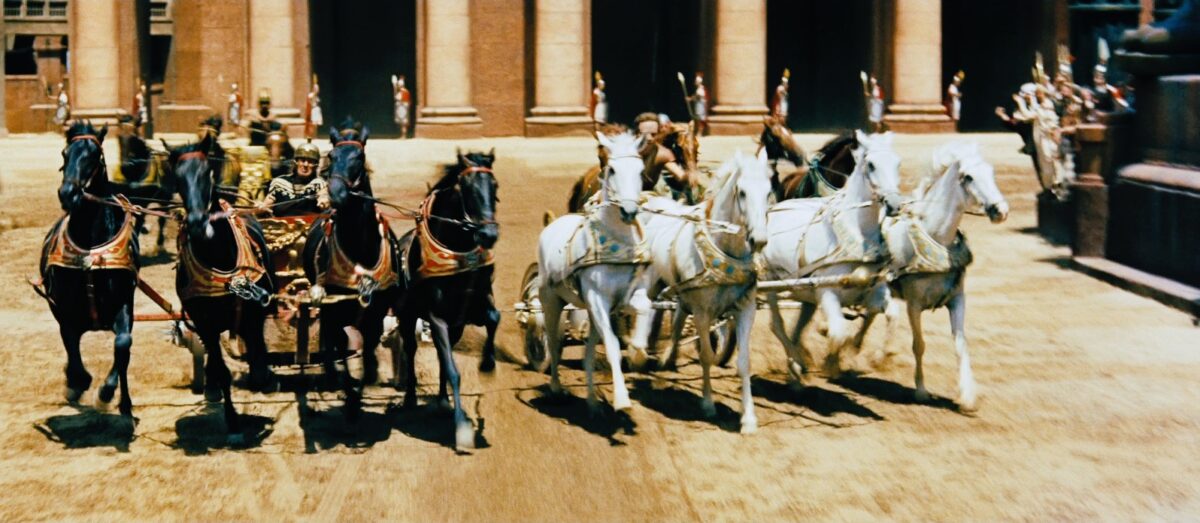Several years after the release of Ben-Hur, William Wyler’s epic, I finally got to see it. I was not disappointed, being generally impressed by its grandeur and pageantry. In particular, I loved its signature chariot race pitting a Jewish prince against a Roman tribune, a scintillating scene now considered a classic in cinema.
I watched Ben-Hur again recently on the Turner Classic Movies channel, and I liked it almost as much as decades ago.
Based on a Tale of Christ (1880) by Lew Wallace, Ben-Hur was a remake of the 1925 silent version. Filmed in California and Italy over an eight-month period at a cost of $15 million, a spectacular sum back then, it went on to become the second highest grossing blockbuster after Gone With The Wind, which was released 20 years earlier.
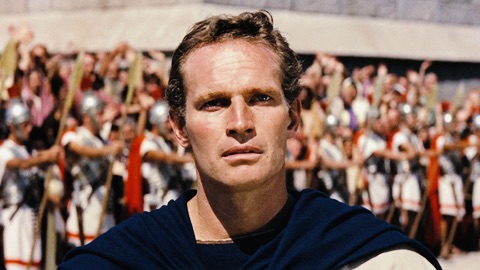
Starring Charlton Heston and Stephen Boyd as the two antagonists and the Israeli actress Haya Harareet as Heston’s love interest, the nearly four-hour marathon features 15,000 extras. Expertly filmed by Robert Surtees and beautifully scored by Miklos Rozsa, Ben-Hur was a resounding critical success, winning 11 Academy Awards, including an Oscar for best picture.
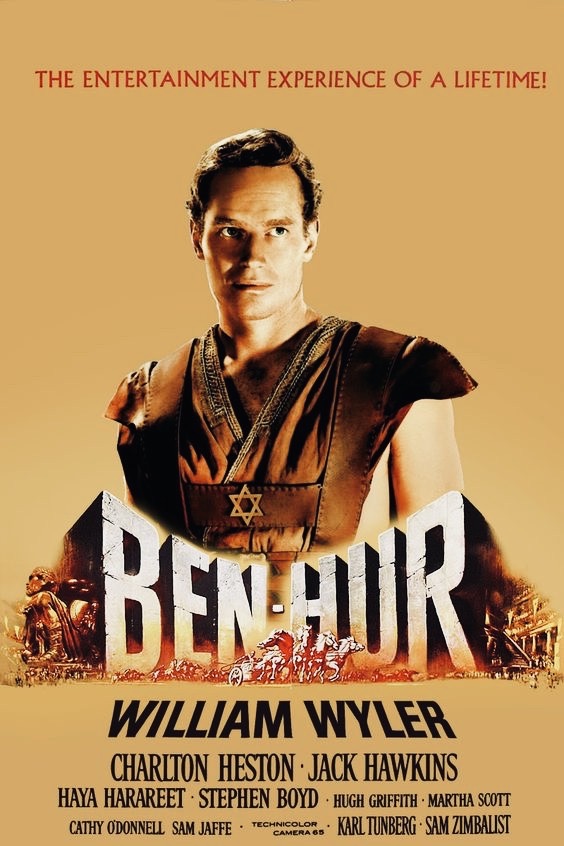
Set in the Roman-conquered Jewish province of Judea in the first century, it is fundamentally a story of Jewish resistance to Roman imperialism during the age of Jesus Christ, who is variously referred to as “the son of god,” “the man from Nazareth,” and “the young rabbi from Nazareth.”
Messala (Boyd), the new Roman ruler in Jerusalem, arrives in Judea at a fraught moment, when Jews are rising up in rebellion. Tasked with crushing the revolt, he rekindles his childhood friendship with Judah Ben-Hur (Heston), a Jewish notable from a princely Jewish family.
Judah is suspicious of Messala’s self-serving overture. “You’re a Roman and I’m a Jew,” he says curtly.
Essentially, Messala wants Judah’s help and advice in dealing with the mounting unrest. Judah advises him to withdraw Roman legions from Judea. Ignoring Judah’s sober recommendaion, Messala retorts, “It’s a Roman world, and if you want to live in it, you’ll have to accept it.”
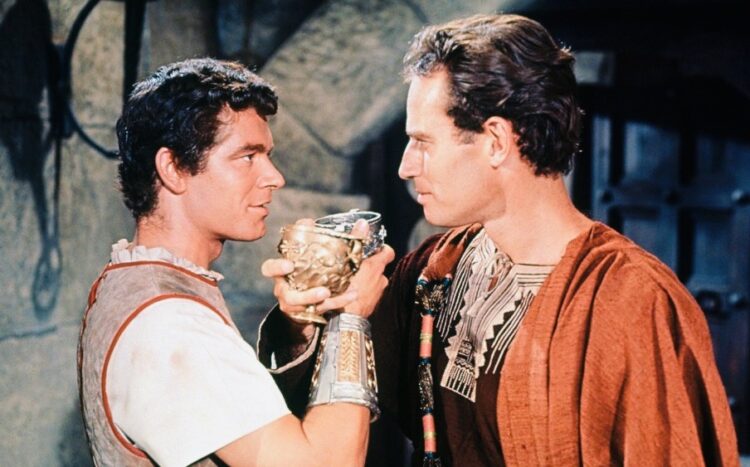
“I believe in the future of my people,” Judah retorts. To which Messala counters, “Convince your people that resistance to Rome is stupid and futile.”
They are clearly on opposite ends of the spectrum. To Messala, the Jewish rebels are “criminals.” To Judah, they are “patriots.”
Still hopeful that Judah will accede to his request, Messala asks for his assistance yet again, but runs into a brick wall. Judah will not “betray” his people.
“You’re a conquered people,” says Messala contemptuously.
“We will rise again,” replies Judah defiantly. “Rome is strangling my people.”
Messala’s patience has reached its outer limits. “You’re either for me or against me,” he warns.
“If that is the choice, I’m against you,” says Judah defiantly, abruptly ending their tense conversation.
This revealing scene sets the tone for what follows. Messala and Judah are now sworn enemies. They are bound to clash sooner or later.
The next turning point occurs when the new Roman governor of Judea leads a parade through Jerusalem in a grand procession. As they watch it, Judah’s sister accidentally dislodges roof tiles which fall on the governor and knock him off his horse.
The consequences are severe. Judah, his sister and mother are immediately arrested. Messala knows they are innocent, but embittered by Judah’s recalcitrance, he chooses to let them rot in jail. Stung by Messala’s cruelty, Judah promises vengeance.
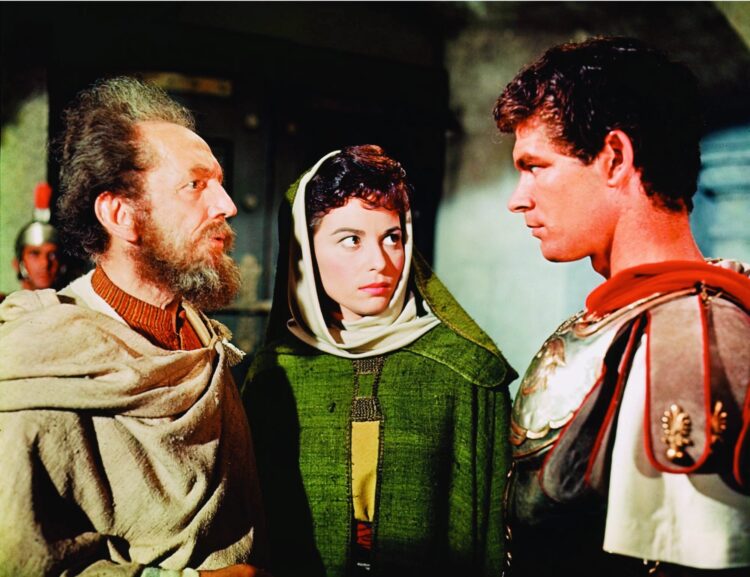
Before he can exact it, Judah is seriously tested. During these scenes, Heston emerges as a tower of strength.
Forced on a perilous death march through the heat and dust of the desert, he meets a total stranger who kindly offers him water. This tall and stately man wears a white robe and has a mane of long brown hair. His face is unseen, but we instinctively know he is the saintly Jesus.
Judah is next seen as an enslaved oarsman on a Roman war ship. Quintus Arrius (Jack Hawkins), the captain of the fleet, takes a shine to Judah and saves him from certain death during a battle. Judah reciprocates his good deed. Grateful to Judah for having saved his life, Quintus Arrius takes him under his wing and adopts him as his son. In Rome, Judah becomes a prized charioteer.
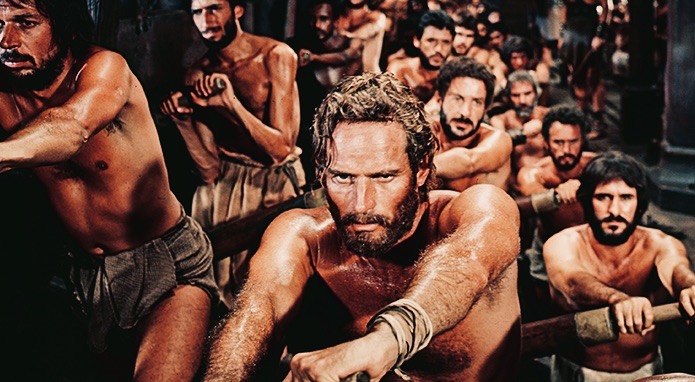
Homesick and worried about the fate of his mother and sister, Judah returns to Judea to look for them. Thanks to information coaxed out of Messala, he discovers they are still imprisoned. In the meantime, Ilderim (High Griffith), a wealthy Arab sheikh who raises Arabian horses, persuades Judah to compete in a prestigious chariot race in Jerusalem at which Messala will compete.
The chariot race, a cinematic spectacle shot in five weeks, unfolds over nine minutes in a packed stadium expressly built for the film. During the race, Messala desperately tries to sabotage Judah, but to no avail.
As the movie winds down, the Romans crucify Jesus, who carries the pain of the world in his emaciated body on the cross.
By the gold standards of the industry, Ben-Hur is an exceptionally fine movie with superior production values and strong performances from a well-chosen cast. But it is far too long and windy and suffers from boring lapses.
Nonetheless, Ben-Hur is a film for the ages whose mass appeal remans undeniable.
